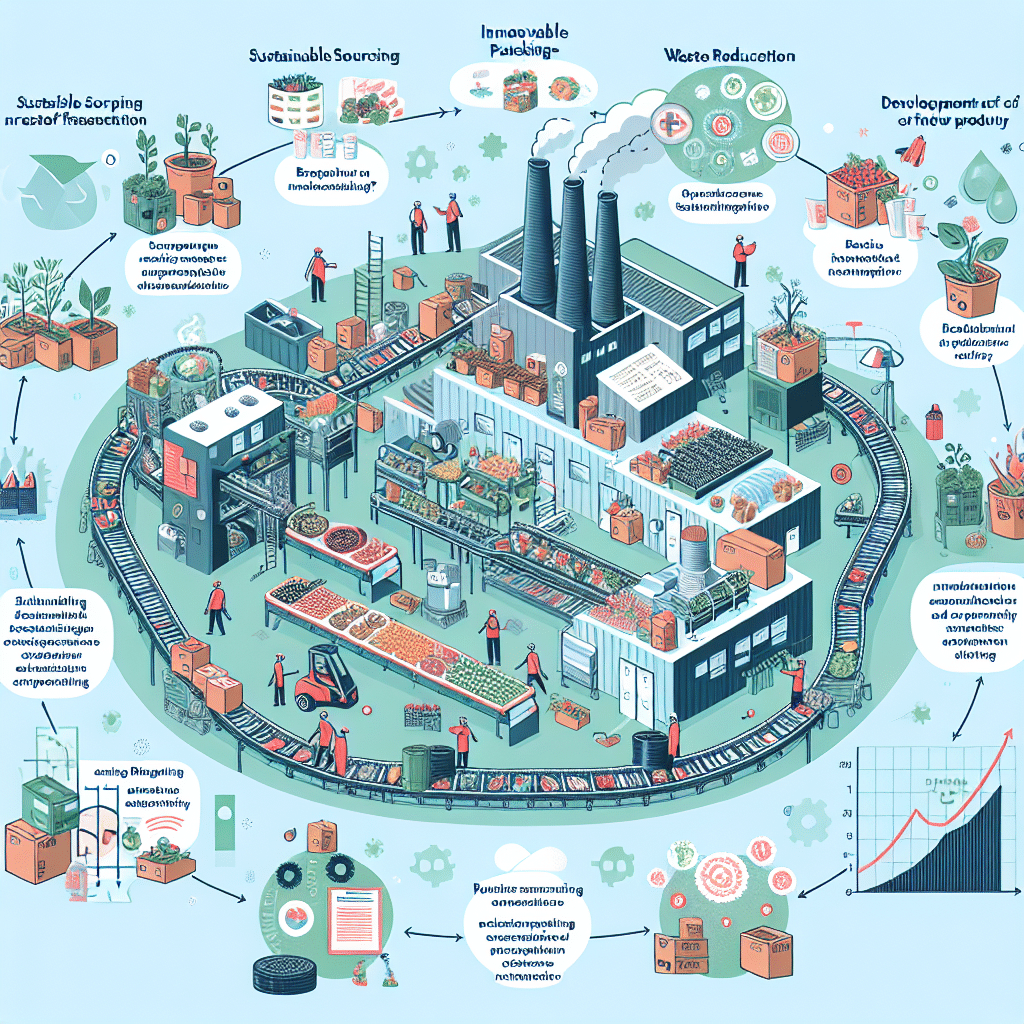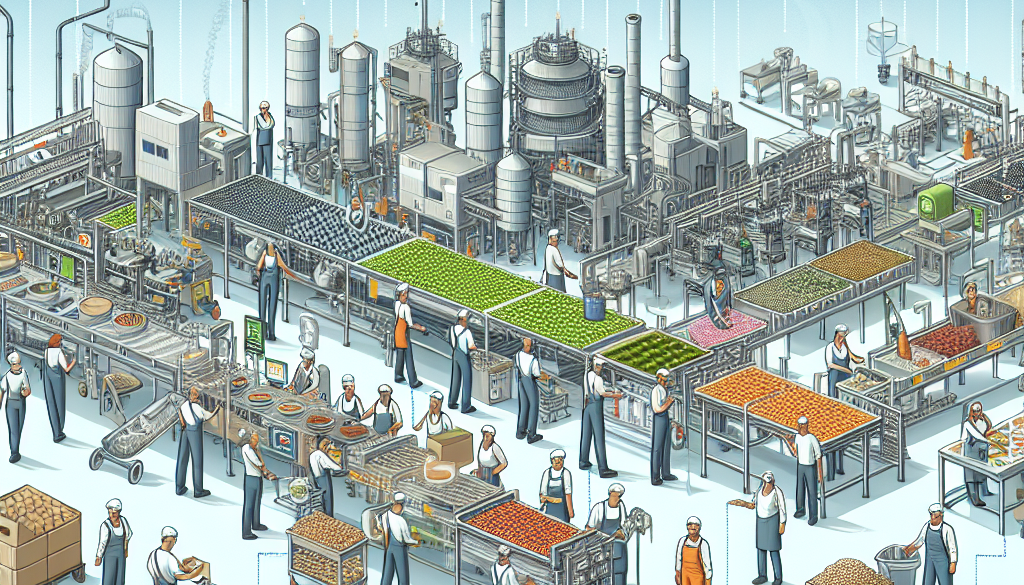Strategies for Boosting Resilience in Food and Beverage Manufacturing
-
Table of Contents
- Boosting Resilience in Food and Beverage Manufacturing: Effective Strategies
- Understanding the Importance of Resilience
- Strategies for Enhancing Resilience
- 1. Diversifying Supply Chains
- 2. Embracing Technological Innovation
- 3. Fostering a Flexible Workforce
- 4. Implementing Robust Risk Management
- 5. Prioritizing Sustainability
- 6. Adapting to Consumer Trends
- 7. Strengthening Quality Assurance
- Case Studies and Statistics
- Conclusion: Key Takeaways for Building Resilience
- ETprotein: Enhancing Your Product Line with High-Quality Proteins
Boosting Resilience in Food and Beverage Manufacturing: Effective Strategies

The food and beverage manufacturing industry is a cornerstone of the global economy, providing essential products to billions of consumers daily. However, this industry faces numerous challenges, including fluctuating supply chains, changing consumer preferences, and the need for sustainable practices. To maintain competitiveness and ensure long-term success, companies must focus on boosting resilience. This article explores strategies that food and beverage manufacturers can implement to enhance their resilience in an ever-changing market.
Understanding the Importance of Resilience
Resilience in food and beverage manufacturing refers to the ability of companies to adapt to disruptions, recover from setbacks, and continue to operate effectively. This is crucial in an industry that deals with perishable goods, strict regulatory requirements, and a high demand for quality and safety. A resilient company can withstand market volatility, supply chain disruptions, and other unforeseen events without compromising on product quality or customer satisfaction.
Strategies for Enhancing Resilience
To build a resilient food and beverage manufacturing operation, companies should consider the following strategies:
1. Diversifying Supply Chains
Reliance on a single supplier or region for raw materials can be risky. Diversification of supply chains can mitigate this risk by ensuring that alternative sources are available in case of a disruption. This may involve:
- Identifying multiple suppliers for key ingredients
- Building relationships with local producers to reduce dependency on international shipping
- Investing in vertical integration to have more control over the supply chain
2. Embracing Technological Innovation
Technology plays a pivotal role in enhancing resilience. Automation, artificial intelligence, and advanced analytics can help manufacturers:
- Optimize production processes
- Improve demand forecasting
- Enhance quality control
- Reduce waste and increase efficiency
3. Fostering a Flexible Workforce
A skilled and adaptable workforce is essential for resilience. Companies should invest in:
- Continuous training and development programs
- Cross-training employees to perform multiple roles
- Creating a culture that encourages innovation and problem-solving
4. Implementing Robust Risk Management
Proactive risk management can help identify potential threats before they become critical issues. This includes:
- Regularly assessing and updating risk management plans
- Conducting scenario planning for different types of disruptions
- Establishing clear communication channels for crisis management
5. Prioritizing Sustainability
Sustainable practices not only benefit the environment but also contribute to resilience by:
- Reducing reliance on non-renewable resources
- Minimizing waste and associated costs
- Building a positive brand image that can attract and retain customers
6. Adapting to Consumer Trends
Consumer preferences can change rapidly, and manufacturers must be agile to respond. This involves:
- Staying informed about emerging trends
- Developing new products that meet changing demands
- Investing in market research to anticipate future needs
7. Strengthening Quality Assurance
Quality assurance is critical in maintaining consumer trust and brand reputation. Manufacturers should:
- Implement rigorous testing protocols
- Ensure compliance with all regulatory standards
- Invest in training for quality control personnel
Case Studies and Statistics
Several companies have successfully implemented resilience strategies. For instance, a global beverage company diversified its supplier base after a natural disaster disrupted its supply chain, reducing future risks. According to a survey by McKinsey & Company, companies that actively invest in supply chain resilience can reduce the impact of disruptions by up to 30-50%.
Moreover, a study by the Food and Agriculture Organization (FAO) indicates that investing in sustainable practices can lead to a 20% increase in long-term profitability for food and beverage manufacturers, highlighting the economic benefits of resilience.
Conclusion: Key Takeaways for Building Resilience
In conclusion, resilience in food and beverage manufacturing is achieved through a combination of supply chain diversification, technological innovation, workforce flexibility, risk management, sustainability, consumer trend adaptation, and quality assurance. By implementing these strategies, companies can navigate the complexities of the industry and emerge stronger in the face of challenges.
ETprotein: Enhancing Your Product Line with High-Quality Proteins
As food and beverage manufacturers strive to boost resilience, partnering with reliable suppliers like ETprotein can be a strategic move. ETprotein’s range of organic bulk vegan proteins and L-(+)-Ergothioneine (EGT) products offer the quality and versatility needed to meet consumer demands for health-conscious and sustainable options. Their non-GMO, allergen-free proteins are ideal for a variety of applications, from sports nutrition to health and wellness products.
By incorporating ETprotein’s high-purity proteins into your product line, you can ensure consistent quality, cater to emerging market trends, and reinforce your commitment to sustainability. Contact ETprotein to explore how their protein solutions can contribute to the resilience and success of your food and beverage manufacturing operations.
About ETprotein:
ETprotein, a reputable protein and L-(+)-Ergothioneine (EGT) Chinese factory manufacturer and supplier, is renowned for producing, stocking, exporting, and delivering the highest quality organic bulk vegan proteins and L-(+)-Ergothioneine. They include Organic rice protein, clear rice protein, pea protein, clear pea protein, watermelon seed protein, pumpkin seed protein, sunflower seed protein, mung bean protein, peanut protein, and L-(+)-Ergothioneine EGT Pharmaceutical grade, L-(+)-Ergothioneine EGT food grade, L-(+)-Ergothioneine EGT cosmetic grade, L-(+)-Ergothioneine EGT reference grade and L-(+)-Ergothioneine EGT standard. Their offerings, characterized by a neutral taste, non-GMO, allergen-free attributes, with L-(+)-Ergothioneine purity over 98%, 99%, cater to a diverse range of industries. They serve nutraceutical, pharmaceutical, cosmeceutical, veterinary, as well as food and beverage finished product distributors, traders, and manufacturers across Europe, USA, Canada, Australia, Thailand, Japan, Korea, Brazil, and Chile, among others.
ETprotein specialization includes exporting and delivering tailor-made protein powder and finished nutritional supplements. Their extensive product range covers sectors like Food and Beverage, Sports Nutrition, Weight Management, Dietary Supplements, Health and Wellness Products, and Infant Formula, ensuring comprehensive solutions to meet all your protein needs.
As a trusted company by leading global food and beverage brands and Fortune 500 companies, ETprotein reinforces China’s reputation in the global arena. For more information or to sample their products, please contact them and email sales(at)ETprotein.com today.














